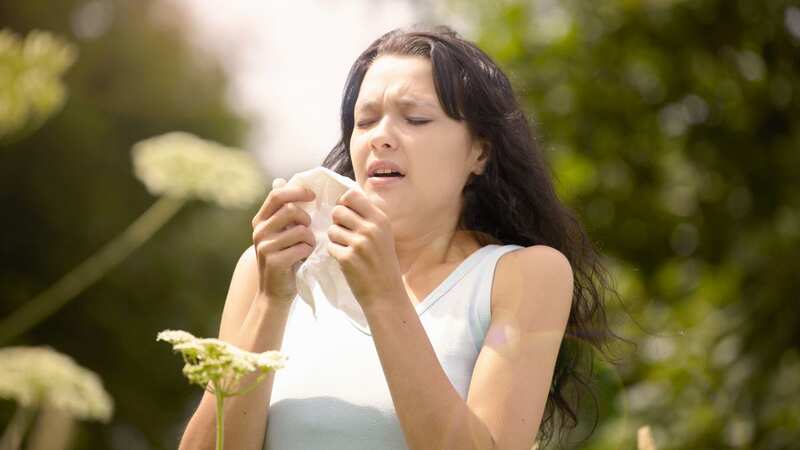How to hayfever-proof your home as 'early UK pollen bomb' predicted

With the UK potentially set to experience an 'early pollen bomb', those who suffer from hayfever might be feeling a bit worried.
The bad news is that the pollen count is rising early this year, with searches for 'is hayfever bad today' going up by 750 per cent in just one week. But don't worry, there are ways you can protect yourself at home.
Experts at Swift Direct Blinds have shared five simple steps to make your home safe from pollen. Here's what you can do to stop hayfever from ruining your year.
1 - Don't hang washing outside
If you dry your clothes outside, they can collect pollen which you then bring into your house. Even though it's nice to hang washing out when the weather gets warmer, if you have hayfever it's better to dry your clothes in a tumble dryer or on a clothes horse inside, reports the Daily Record.
2 - Shower as soon as you get home
When you're outside, pollen can stick to your clothes, hair and skin. If you then go inside, you could be bringing the pollen in with you. To stop this from happening, leave your shoes at the front door when you get home, change your clothes and have a shower to wash off any pollen. Another good thing about this is that the hot steam from the shower can help to ease allergy symptoms.
 Hay fever warning for Brits as UK's top pollen hotspots for 2023 are revealed
Hay fever warning for Brits as UK's top pollen hotspots for 2023 are revealed
3 - Remove carpets
This may seem like a drastic step compared to not hanging your clothes up outside, however removing carpets from your home is a good way to reduce pollen. This is because pollen can stick to carpets and is difficult to remove.
For those suffering more seriously from hay fever, removing carpets and opting for hard flooring should help to alleviate symptoms while at home. This isn't an option for many though, so if you find yourself in this position, If removing your carpets isn't an option, instead up the frequency of vacuuming and try to do this at least twice a week.
4 - Keep soft furnishings clean
Over time pollen will naturally build up on soft furnishings throughout the home such as curtains, blinds, rugs, throws and pillows. This allows it to become a hotbed for pollen. To tackle this, you should wash these at least once a month to keep pollen at bay. For curtains that can't be washed, vacuuming weekly with an upholstery attachment or using a steam cleaner is a great way to quickly soften any dust and dirt.
5 - Keep windows and doors closed
Whilst it can be nice to get fresh air, leaving windows and doors open during the day invites pollen into your home. You should try keeping them shut as much as possible as this is one of the most effective ways to prevent pollen from entering your home. This is especially important in bedrooms to prevent allergens from stopping you from getting a good night's sleep. If you do need to open windows, only do this overnight when pollen counts are much lower or keep blinds or curtains closed to help act as a barrier.
For blinds, you can use a soft microfiber cloth to remove any dust such as on Venetian blinds, wooden blinds or shutters. For fabric blinds such as roller or Roman blinds, use a vacuum with an upholstery brush attachment on a low setting to remove dust. Move the vacuum in the direction of the fabric weave to prevent damage. You can use a mild detergent to remove stains and grime build-up, but make sure the cleaning product is safe to use on your blind fabric.
Hay fever expert tips
Kate Duckworth, trends and interior expert at Swift Direct Blinds has shared her expert tips on keeping your home allergy-proof. She said: "With almost 10 million people said to suffer from hayfever each year, many of us will experience symptoms as the pollen count rises. But for some people, the problem is worse than others, so it's worthwhile knowing a few simple techniques to keep pollen and allergens out of your home to make hay fever season a little more bearable.
"With the warmer months slowly approaching, many people will be spending increasing amounts of time outdoors. However, when pollen counts are particularly high it's best to opt to stay indoors and when you do get home, change and shower as soon as possible to prevent bringing pollen into your home. Additionally, avoid hanging washing outside as this will also create a vessel for pollen to enter the home.
"Often one of the most tricky obstacles for allergy sufferers is being able to sleep. So making sure you action some of these points such as keeping windows and doors closed, regularly washing soft furnishings and removing or more frequently vacuuming carpets is even more important in bedrooms, especially for children and older people suffering from hay fever."
Read more similar news:
Comments:
comments powered by Disqus

































